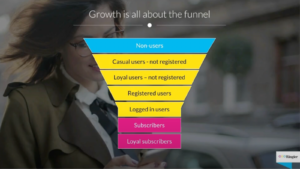What does “digital transformation” mean to you?
My recent LinkedIn connection David Jansson turned me on to theaudiencers.com, which looks like a fantastic website for people in the media and publishing space. I was intrigued by an article titled “The 5 Rs of digital transformation: how Ringier is shaping the long-term success of its media titles,” by Madeleine White, which I’ll review today.
 Right off the bat I have to disagree with part of this article. It says “growth is all about the funnel” – and then shows an image of “the funnel” – which implies that every contact goes through the same journey towards a single goal, such as a subscription.
Right off the bat I have to disagree with part of this article. It says “growth is all about the funnel” – and then shows an image of “the funnel” – which implies that every contact goes through the same journey towards a single goal, such as a subscription.
I don’t think that’s right. I think it’s possible to have branching funnels with different goals. For example, you could recognize that part of your audience will never subscribe, so you put them in an advertising funnel and treat them very differently than the people with a propensity to subscribe, who you put in a subscription funnel.
The basic concept of moving people through a funnel is sound, but I don’t like limiting it to only one funnel.
I have a bias towards models, checklists, frameworks, acronyms and things that help organize the thoughts – so I was drawn to “the 5 R’s of digital transformation,” which are …
Relevance – that’s a good one, although I would add “valuable.” An article might be “relevant” to me in some generic sense, but not help me in any way.
Reputation is important. I want reliable information.
Reach isn’t my favorite concept for media companies. I have a separate podcast on that which I’ll link below.
Revenue is crucial for the publisher, of course.
Resilience is framed as diverse revenue streams, which is very important. Try not to be overly dependent on any given stream.
The Ringier Group also takes a cross-functional approach these topics, with people from advertising, editorial, business development, audience development, product, tech and digital user market. That’s fantastic, and I would love to see some stories about how they get all these groups to work together effectively.
What I was hoping to see in this article was something about what “digital transformation” really means to them.
For some, “digital transformation” means “moving from print to digital” – which I think is the wrong way to look at it.
Rather, “digital transformation” should mean “how do we effectively serve people digitally.” Too often I see “digital transformation” as not much more than antipathy to print, which is wrong-headed. Print is a smaller piece of the puzzle, but still an important piece of the puzzle. There are situations where print is better, and there are situations where digital is better.
Links
The 5 Rs of digital transformation: how Ringier is shaping the long-term success of its media titles




